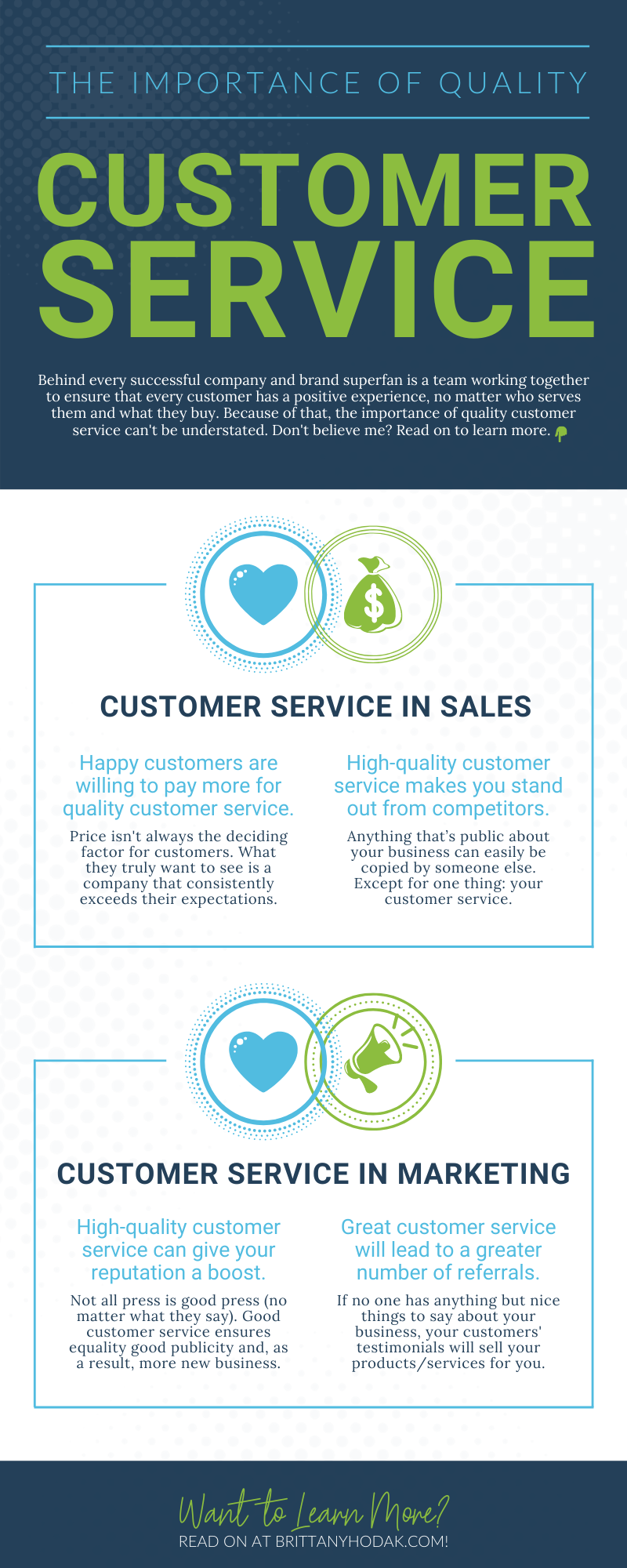Looking at the average business, it doesn’t take an expert to see that there are a ton of moving parts. For members of leadership, there’s managing the company strategy and setting goals for the rest of the team. For salespeople and marketers, there’s meeting revenue goals and testing different methods of bringing in new customers. Underlying all of these efforts, however, is a team-wide dedication to customer service and providing value whenever possible. Because of this — regardless of the size of your team, the age of your company, or your goals for the future — the importance of quality customer service cannot be understated.
“But isn’t customer service just a single department?” you may ask? In this guide, we’ll cover why customer service plays a critical role in all departments. Specifically, we’ll talk about the ways in which it can work into your sales and marketing efforts. For each of these, we’ll also examine what high-quality customer service looks like. That way, you can integrate new and best practices in your business immediately.👌
The Basics of Customer Service
Before we get into the importance of quality customer service, let’s go through the basics. If you haven’t worked in a service-oriented job, the term “customer service” can seem a little ambiguous.
What is customer service?
To start, many business owners create their companies thinking that customer service is a single department. In said department, employees handle customer questions about the company’s products or services. They also generally handle returns or refunds, plus any small matters that come up in day-to-day customer interactions. In other words, their primary role is putting out fires and making sure that any customer issue is resolved as efficiently and painlessly as possible.

However, too often, when a customer raises a question, concern, or complaint with an employee who isn’t designated as a “customer service professional,” this “fire extinguishing” process stops abruptly. Instead of being heard immediately, the customer is redirected to the customer service department. Here, in many cases, they have to wait for assistance and explain their question or concern all over again. If you’re like me, you’re reading this remembering a time this happened to you (and also wishing that you weren’t reliving the aggravation again). What a terrible customer experience!
To prevent incidents like these, businesses with the best customer service make it a team-wide effort. Rather than having a single department for serving customers, everyone on the team is held to the same standards and empowered to provide exceptional service whenever possible through their primary job responsibilities. If you’re on the sales team, this means answering customer questions with transparency and patience. If you’re focused on product development, this means listening to customer feedback and planning changes in accordance with it. Whatever your role, the goal is to make sure customers have a positive experience with every employee with whom they engage. That way, they leave happy and know they can rely on quality customer service every time they return.
Why does customer service matter in my business?
So, why does customer service matter? Although we’ll get into specifics shortly, in a general sense, customer service is one of the biggest factors that determines whether a first-time customer turns into a regular. It also can mean the difference between a customer who is happy and one who is ecstatic. This is someone that not only buys from your company but tells their connections about it, too. These “superfan” advocates are the key to increasing referrals… and revenue!
Essentially, providing your customers with quality customer service doesn’t just help you close a sale today. It also creates the opportunity to develop that initial positive experience into a lifelong relationship. Even if someone initially approaches you without intent to buy anything, good customer service can turn them into a customer when they are ready to make a purchase. From there, another positive experience can make them a return customer, and another can make them an evangelist for your brand. In a nutshell, the importance of quality customer service stems from each customer’s potential and how great the return can be if you invest your time and energy into serving them well.
Would you treat a potential customer differently if he or she had the potential to spend six- or seven-figures with your business? Well, there’s a high probability that every customer does. Don’t just think about the short term potential — consider the potential lifetime value of that customer returning again and again and again and telling their friends and colleagues to do the same.
The Importance of Quality Customer Service in Sales
We’ve covered the basics of customer service and how it’s beneficial to a given business, as a whole. However, depending on your role within a business, practicing exceptional customer service may have a different impact on you than on other members of your team. Below, we will focus on sales and marketing as the two largest parts of a business’s ecosystem, starting with sales.
Happy customers are willing to pay more for quality customer service.

First, from a customer’s point of view, choosing between products or companies isn’t always price-dependent. In fact, for many customers, their main concern is closer to “What do I get for the price?” than simply “What’s the price?” Although this can mean more time spent with each customer, it also gives you an opportunity to highlight the value they’re getting. That way, even if your price is higher, they’ll understand. On average, they’ll even be willing to pay a premium (up to 16%), simply because they know they’ll receive exemplary products and services.
In the midwestern U.S., a great example is the Iowa-based grocery chain Hy-Vee. Although the first Hy-Vee location was established in 1930, it wasn’t until relatively recently that they expanded to their current size (more than 200 locations in eight states). Because of this, their stores tend to stand out, especially in small towns where local grocers have operated for decades without competition. Combine this with Hy-Vee’s higher prices and you might assume a new location dead on arrival. Yet, even in small towns, Hy-Vee consistently receives glowing reviews from customers, many of whom cite their outstanding customer service as a reason to shop there.
In this example, and in many categories of goods and services, price isn’t necessarily a deciding factor for customers. What customers truly want is to have their needs not only met, but exceeded, consistently. They want to feel valued, and know the company they are shopping with understands the importance of quality customer service for every customer, every day.
Plus, take it from someone who grew up in town with one stoplight and 2,500 people: If a chain can win over small towns with customer service, even with higher prices, you can do the same with your business. 👍
Consistently providing high-quality customer service makes you stand out.
Besides price, the importance of quality customer service also comes into play when considering your competition. Nowadays, if a company does something unique, it’s relatively easy for others to replicate — or even straight-up steal — it. If you have low prices, your competitors can undercut them. If you have fun and modern brand colors, they can update theirs to match. Even if you launch a new product or service, they can release one to compete with it. Especially if you’re a virtual company, anything that’s public about your business can easily be copied by someone else. In fact, there’s only one theft-proof aspect of business: Your customer service.
Speaking of virtual businesses, a great example is customer relationship management (CRM) company HubSpot. Compared to many CRMs, HubSpot is daunting for a few reasons. These include the price of individual feature sets as well as the complexity of the platform itself. Considering these concerns, many business owners originally opt for a cheaper system, even if it means fewer features and less accessible customer support. However, although these losses can be easy to accept initially, they can eventually lead to frustration, especially considering how much profit can come from using a CRM well.
In this example, although HubSpot isn’t worth the cost initially, to some, it eventually comes out on top. This is thanks largely in part to the services they provide for their customers. Whether a customer is looking for free resources, online courses, video tutorials, or customized coaching, HubSpot doesn’t just say, “We’re here to help!”. They provide the support to prove that they mean it, too. Likewise, in your own business, don’t think of customer service as icing on the cake. Think of it as a way to ensure you stand out from other businesses in your industry.
The Importance of Quality Customer Service in Marketing
If sales is one side of the business coin, the other side is marketing. Just as in sales, the importance of customer service in marketing can mean the difference between just getting by and growing exponentially. Below, we’ll look at two of the most significant reasons this is true along with a few companies that have used it to their advantage.
High-quality customer service can boost your reputation.
The first marketing-specific component of customer service is the link between your company’s customer service and its reputation. For most businesses, providing exceptional customer service generally means a boost to their reputation. By extension, this means free marketing, as happy customers tell others about their positive experience. In fact, word of mouth is by far the most trusted form of advertising. On the flip side, however, failing to provide high-quality customer service can have the opposite effect on a company’s reputation, undermining their public persona and their marketing efforts.
Over the last 20 years or so, this has become increasingly true with the accessibility of social media and mobile cameras. Today, since nearly every customer has a camera in their pocket and can go live on social channels instantly, every customer service interaction — good or bad — has the potential to be streamed by millions.
In your own business, this brings me back to the beginning of this guide and the importance of training everyone on your team to provide a consistently high level of customer service. Essentially, it comes down to numbers and the amount of risk you’re willing to take. If four out of ten employees are trained on customer service, that’s fine…provided that you’re absolutely sure customers will only ever interact with those specific employees. Conversely, if all ten employees are trained in customer service, the customer will be comfortable, no matter who is helping them. Perhaps even more importantly, your company’s risk of bad publicity will decrease dramatically because all employees operate by the same code of conduct.
Great customer service will lead to a greater number of referrals over time.
The second marketing-specific element of customer service is, quite simply, the number of referrals good customer service gets you! We touched on this already in the previous example about Hy-Vee. However, there are two additional ways that customer service plays a role in bringing in referrals, specifically.
The first way uses customer service to reward customers for (a) being a regular, (b) referring others, or (c) both. Here, customers receive a discount, commission, or other consideration for sending business your way. This not only thanks them for their continued support of your business. It also incentivizes them to promote you to their friends and family, bringing more customers your way.
The second way is through positive reviews and recommendations: In short, being so good that your customers can’t help but tell their friends. In this case, although there’s no inherent reward for customers who refer others, the thought of recommending another company doesn’t enter their minds. To them, you and your team have the best products and services and the best customer service. Because of that, they don’t have any reason to recommend anyone but you.
With either of these options, the fact remains: If you want existing customers to sing your praises (i.e. do some of your marketing for you), you have to first make sure they are supported to an exceptional degree. From the day you meet them to the day they no longer need your services, your goal should be to make them feel welcomed, appreciated, validated, and engaged. That way, they know that you see them as more than a sale and that you’re grateful for their support, financial and otherwise.
How to Ensure Quality Customer Service
I hope that now — after more than 2,500 words — the importance of quality customer service is clear! Really, the hardest part can be looking at your own company’s customer service and asking, “How can I make this better?” While this isn’t an easy challenge to tackle, it’s a pursuit whose ROI will be exponential. Plus, if you’re looking at your business with a growth mindset, you’re already on the right track!
If you want to boost customer service in your business to create brand evangelists (or, in my parlance, “superfans”), follow the five steps below to get started.
- Make sure that elements of customer service appear in your company’s core values. If customer service isn’t included here, no one can be held accountable to make it a reality.
- Track customer satisfaction closely and regularly. If you don’t have a process for requesting feedback, it’s impossible to know which areas need improvement. Hint: there’s almost always room for improvement in every area.
- Build feedback into your sales process. After every sale, your team should be asking “What can we do to make this experience even better?”
- Send out hand-written “thank you” notes to long-time or contract customers. It sounds tedious, but a personal touch never hurts.
- Consider launching a rewards or referral program, if you haven’t already. If you have, review your current program(s) to see where it can improve.

